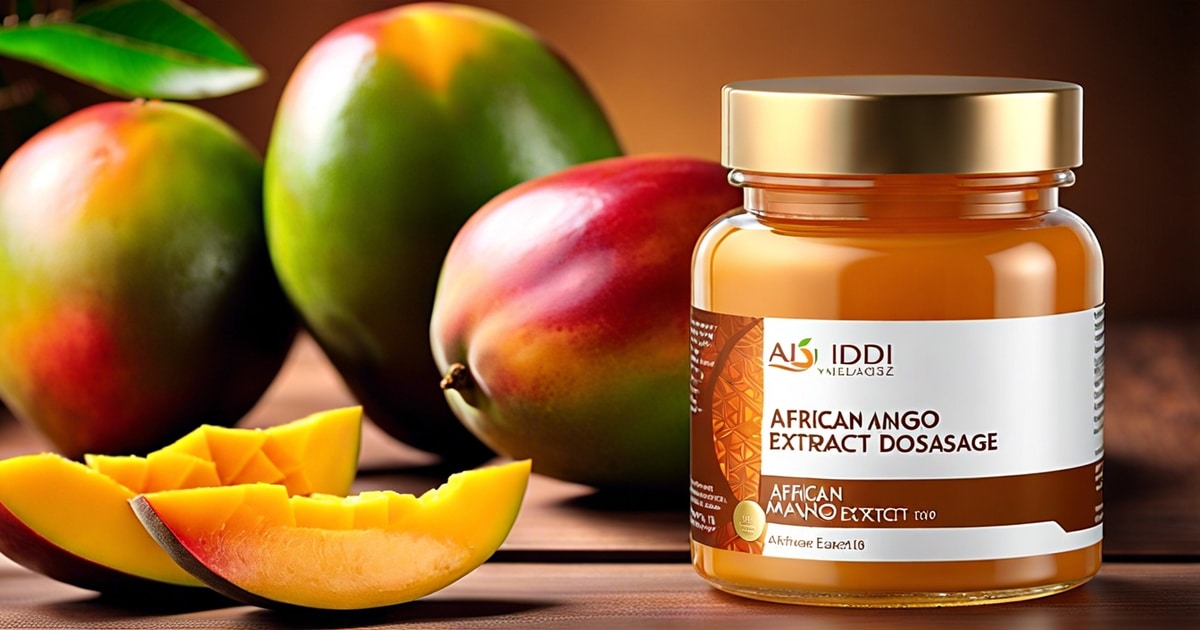Key Takeaways
- Consider incorporating African Mango seed extract as a dietary supplement for potential health benefits such as weight management and improved metabolic health.
- Consult a Healthcare Professional: Before starting any new dietary supplement regimen or weight loss supplementation, consult a healthcare provider to determine the appropriate dosage and ensure it is safe.
- Stay Informed: Learn about African Mango benefits and how dietary supplements can contribute to your overall well-being.
- Evidence-Based Benefits: The weight loss potential of African Mango extract is supported by research findings, making it a promising option for individuals looking to manage their weight.
- Monitor for Adverse Effects: Be aware of potential adverse reactions and side effects associated with African Mango supplementation, dietary supplements, and discontinue use if you experience any negative effects.
- Research Backed: The clinical overview and research findings on African Mango, a weight loss supplement, provide valuable insights into its efficacy and safety profile.
Did you know that the African mango, also known as Irvingia gabonensis, is not just a fruit but a powerhouse of health benefits and nutrition? Packed with fiber, vitamins, and antioxidants, this exotic mango fruit gem has been creating waves in the wellness world. From aiding weight loss by boosting metabolism to promoting heart health and reducing inflammation – the African mango offers many advantages waiting to be explored. Let’s delve into the realm of mango trees and uncover how nutrition can revolutionize your well-being.
Scientific Family and Botanical Information
Irvingiaceae Family
African mango, scientifically known as Irvingia gabonensis, is part of the Irvingiaceae family. This family includes various tropical trees that bear edible fruits, with the African mango being one of them.
African mango is a tree crop native to West Africa, thriving in the tropical climate. The Irvingiaceae family encompasses several species used for their medicinal properties and nutritional value.
Tropical Fruit Origins
The scientific classification of the African mango underlines its significance in pharmaceutical biology and food technology due to its potential health benefits. As a fruit-bearing tree, the African mango plays a vital role in traditional agriculture practices in West Africa.
- Medicinal plants: African mango’s presence within this category highlights its importance beyond just being a fruit.
- Plant materials: The utilization of different tree parts underscores its versatility.
- Fruit yield: Understanding the fruit’s production capacity sheds light on its agricultural value.
History and Chemistry of African Mango
Traditional Use
The African mango, a food with its rich history in traditional medicine, has been utilized for its various health benefits for centuries. The fruit’s seeds are particularly noteworthy for their abundance of bioactive compounds that contribute to the numerous advantages of African mango consumption.
The Irvingia extract, a prominent active ingredient in African mango seeds, is responsible for many of the fruit’s beneficial properties. This extract is known to positively affect weight management by supporting metabolism. It has been linked to improved cholesterol levels and blood sugar regulation.
Health Benefits
- Supports weight management
- Aids in reducing fat cell growth
- Improves cholesterol levels
- Regulates blood sugar
Incorporating African mangoes into your diet can potentially offer a range of advantages beyond those related to weight loss. From promoting heart health through cholesterol improvement to enhancing overall well-being via better blood sugar control, the benefits of consuming African mangoes extend far beyond mere weight management considerations.
Nutrients Found in African Mango

Rich in Fiber, Vitamins, and Minerals
African mango contains essential nutrients like fiber, vitamin C, and vitamin A. The high fiber content aids digestion and promotes a feeling of fullness. This fruit also boasts significant amounts of vitamin C, supports the immune system, and helps the body absorb iron efficiently.
In addition to food and vitamins, mangoes contain vital minerals such as potassium and magnesium. Potassium plays a crucial role in regulating blood pressure levels, while magnesium contributes to various bodily functions, including muscle function and nerve health. These minerals are fundamental for overall well-being.
Essential Nutrients for Health
Including African mango in your diet can help you easily meet your daily nutrient requirements. The combination of vitamins, minerals, and fiber makes it nutritious for maintaining good health. Consuming this fruit regularly supports your immune system, improves digestion, and enhances overall vitality.
- High fiber content aids digestion
- Significant source of vitamin C for immunity
- Provides essential minerals like potassium and magnesium
Key Benefits of African Mango Seed Extract
Supports Healthy Cholesterol Levels
African mango seed extract is known to promote healthy cholesterol levels. By consuming this novel food seed extract, you may experience improvements in your cholesterol profile. This can be crucial for maintaining overall heart health and reducing the risk of cardiovascular diseases.
Consuming regular mangoes might not provide the same benefits as African mango seed extract. The unique properties of this seed extract make it a valuable addition to a healthy diet focused on heart wellness.
Antioxidant Properties
One of the notable advantages of African mango seed extract is its antioxidant properties. These antioxidants play a vital role in protecting your body against oxidative stress, which can lead to various health issues over time. Incorporating this extract into your daily routine can boost your body’s defense mechanisms against harmful free radicals.
- Helps support healthy cholesterol levels
- Offers antioxidant protection against oxidative stress
Weight Loss Potential of African Mango Extract
Weight Loss Promotion
Research indicates that African mango extract promotes weight loss by reducing body fat and waist circumference (et al.). This natural ingredient offers a potential solution for individuals who manage their weight effectively. Studies have shown promising results in both animals and humans, suggesting its efficacy as a weight loss supplement.
African mango extract has been found to positively impact metabolic parameters associated with obesity, making it a valuable addition to weight management routines. By incorporating this supplement into their daily regimen, individuals may experience improvements in their overall body composition and achieve better control over their weight.
Health Benefits
The benefits of African mango extract extend beyond just aiding in weight loss; they also include enhancing metabolic functions related to fat loss and improving markers such as leptin levels. These advantages make it an attractive option for those looking to address issues concerning overweight or obesity. Incorporating African mango extract into one’s diet can contribute significantly to better health outcomes related to excess body fat.
- Promotes weight loss effectively
- Reduces body fat and waist circumference
- Improves metabolic parameters associated with obesity
Dosage, Usage, and Safety Profile

Recommended Dosage
The dosage of African mango extract varies by product but is generally taken as a supplement before meals. It’s crucial to adhere to the specific guidelines provided for each product. Some supplements may recommend taking it once or twice daily.
Taking African mango extract before meals can help with weight loss efforts by promoting feelings of fullness and reducing overall food intake.
- Varies depending on the product
- Typically taken before meals.
Safety Considerations
While African mango extract is considered safe, following the recommended dosage guidelines is essential. Exceeding the suggested amount may lead to adverse effects or interactions with other medications.
It’s always advisable to consult with a healthcare professional before starting any new supplement regimen, especially if you have existing health conditions or are taking medications that could interact with African mango extract.
- Generally safe when used correctly
- Consult healthcare provider beforehand.
Adverse Reactions and Side Effects
Gastrointestinal Discomfort
Some users may encounter mild gastrointestinal discomfort like bloating or gas when consuming African mango extract. This reaction is temporary and diminishes as the body adjusts to the supplement.
African mango’s high fiber content can sometimes lead to digestive issues, especially if introduced suddenly in large amounts. To mitigate this, individuals can gradually increase their supplement intake to allow their bodies to adapt.
Allergic Reactions
While rare, there have been instances of allergic reactions to African mango. Symptoms may include itching, rash, swelling, or difficulty breathing. Those with known allergies or sensitivities must seek medical advice before trying African mango supplements.
- Pros:
- Natural source of fiber
- May support weight management
- Cons:
- Potential for mild gastrointestinal discomfort
- Rare risk of allergic reactions
Clinical Overview and Research Findings
Promising Results
Recent clinical studies have highlighted the potential benefits of African mango extract. These studies suggest that this natural remedy could be beneficial for individuals struggling with metabolic syndrome. For instance, research has shown improvements in markers associated with metabolic health after consuming African mango supplements.
Various human studies and randomized controlled trials support the positive impact of African mangoes on metabolic syndrome. These findings indicate that incorporating African mangoes into one’s diet may lead to significant improvements in overall health outcomes related to metabolic issues.
Further Research Needed
Despite these promising results, it is essential to note that more comprehensive research is required to fully comprehend African mango’s therapeutic effects. While existing studies provide valuable insights into its potential benefits, further exploration through additional clinical trials and systematic reviews will help solidify these findings and determine its effectiveness as a treatment option for various health conditions.
Closing Thoughts
You’ve learned about African Mango and uncovered its fascinating history, chemistry, and impressive nutrient profile. The benefits of African Mango seed extract for weight loss and overall health are remarkable. Always follow the recommended dosage and usage guidelines to ensure safety while reaping the benefits. Despite its potential adverse reactions, the clinical research findings underscore the promising impact of African Mango on various health aspects. As you consider incorporating African Mango into your wellness routine, consult a healthcare professional for personalized advice tailored to your needs. Embrace the journey towards a healthier you with the power of African Mango by your side.
Frequently Asked Questions
What is African Mango’s scientific family and botanical information?
African Mango, scientifically known as Irvingia gabonensis, belongs to the family Irvingiaceae. It is a tropical fruit tree native to West Africa, particularly in Nigeria and Cameroon.
What are the key benefits of African Mango seed extract?
African Mango seed extract offers various benefits, such as aiding in weight loss by supporting metabolism and reducing appetite, improving cholesterol levels due to its high fiber content, and potentially enhancing blood sugar control.
Is African Mango extract effective for weight loss?
Research suggests that African Mango extract may support weight loss by promoting fat breakdown and metabolism. However, for optimal results, it’s essential to combine its use with a healthy diet and regular exercise.
Are there any adverse reactions or side effects associated with African Mango consumption?
While generally considered safe for most people when taken in appropriate doses, some individuals may experience minor side effects like gas, bloating, or headaches. It’s advisable to consult a healthcare professional before starting any new supplement regimen.
How much African Mango extract should one take daily?
The recommended dosage of African Mango extract typically ranges from 150 mg to 500 mg per day. However, individual needs may vary based on age, health status, and specific product formulations. Always follow the instructions on the product label or consult a healthcare provider for personalized guidance.

